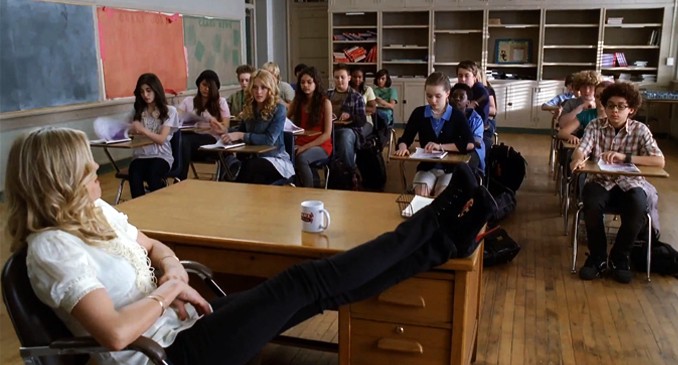We Have A Teacher Crisis So, Sure, Let’s Obsess Over One Educator’s Wardrobe
I mean, come ON

American teachers are leaving the profession in droves, while young people are giving the profession serious side-eye and saying, “Uh, pass.”
America has a teacher shortage, and a new study says it’s getting worse
Between lack of interest and attrition, we have a bona fide crisis.
Enrollment in teacher-preparation programs dropped from 691,000 in 2009 to 451,000 in 2014, a 35 percent decline, according to the study, “A Coming Crisis in Teaching? Teacher Supply, Demand and Shortages in the U.S.”
“Our analysis estimates that U.S. classrooms were short approximately 60,000 teachers last year,” Leib Sutcher, the study’s co-author, told reporters Tuesday ahead of the study’s release. “Unless we can shift these trends, annual teacher shortages could increase to over 100,000 teachers by 2018 and remain close to that level thereafter.”
A significant part of the reason for both attrition and lack of interest in the field? Low pay. One expert told the Post:
teachers make about 20 percent less than other college graduates and that teacher salaries have lost ground since the 1990s. That despite increased teaching hours and less time for classroom preparation.
“In more than 30 states, a mid-career teacher heading a family of four is eligible for government assistance,” she said.
In more than half of U.S. states, we pay teachers so little that they cannot raise their own children without help from the government. That’s embarrassing.
As the Post reported recently in a separate piece, even if you’re aware that teachers aren’t well compensated, you may still be surprised by the grimness of the reality.
* Average weekly wages (inflation adjusted) of public-sector teachers decreased $30 per week from 1996 to 2015, from $1,122 to $1,092 (in 2015 dollars). In contrast, weekly wages of all college graduates rose from $1,292 to $1,416 over this period.
* For all public-sector teachers, the relative wage gap (regression adjusted for education, experience, and other factors) has grown substantially since the mid-1990s: It was ‑1.8 percent in 1994 and grew to a record ‑17.0 percent in 2015. *
Plus, if you do take on the thankless and underpaid job of educating America’s kids, masses of people feel like they get to criticize you for your personal choices, up to and including what you wear to work. Which is brings us to the curious case of #TeacherBae.
Anyone Saying This Teacher’s Wardrobe Is Inappropriate, Kindly Take A Seat
Because of her clothes, Patrice Brown, a fourth-grade teacher in Atlanta, GA, became a subject of passionate, occasionally vitriolic, debate. ScaryMommy summarizes: “Her outfits are being widely scrutinized, for no apparent reason, and #TeacherBae is trending on Twitter, with everyone weighing in on whether this woman should be allowed to dress herself.”
There is, maybe, a conversation to be had about workplace dress codes at a time when formality is giving way, even in more conservative environments, and young people tend to have a very different sense of what’s appropriate than do their elders. But this is not that conversation. This is mostly sanctimonious blather that falls into the following categories:
- “The boys will be distracted!” A raindrop could distract a nine-year-old.
- “TOO SEXY.” That’s, like, your opinion, man.
- “When I was your age ….” Thanks for chiming in, Clint Eastwood.
By all accounts, Patrice “Educator of the Month” Brown is a good teacher. But the Internet doesn’t care about the quality of her work; it prefers to make an issue of her appearance, even if that has a chilling effect on recruitment. It’s particularly frustrating because America needs more minority teachers like Brown, according to the Post.
Although compensation was a factor for minority teachers, it wasn’t the only one, Ingersoll said.
“We need to work on working conditions,” he said. “Among the key conditions that drive out minority teachers are a lack of autonomy and discretion in the classroom.”
Gee, I can’t imagine why any teacher would feel like they lacked autonomy and discretion.
Support The Billfold
The Billfold continues to exist thanks to support from our readers. Help us continue to do our work by making a monthly pledge on Patreon or a one-time-only contribution through PayPal.
Comments